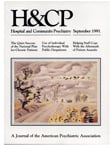A Program to Help Staff Cope With Psychological Sequelae of Assaults by Patients
Abstract
Mental hospital staff who are assaulted by patients are at risk of developing symptoms associated with posttraumatic stress disorder. The Assaulted Staff Action Program (ASAP), a voluntary program, offers support to staff victims of patient assaults in a state mental hospital. ASAP team members debrief assault victims, assessing the victim's sense of control, social supports, and ability to make sense of the incident. A short-term support group is offered. During the program's first 90 days, the team responded to 67 assaults. Ten days after the assaults, many of the victims had not regained a sense of control, did not have a support network, and were unable to make sense of the incident. These factors put them at risk for PTSD symptoms. The costs of such a program are discussed.
Access content
To read the fulltext, please use one of the options below to sign in or purchase access.- Personal login
- Institutional Login
- Sign in via OpenAthens
- Register for access
-
Please login/register if you wish to pair your device and check access availability.
Not a subscriber?
PsychiatryOnline subscription options offer access to the DSM-5 library, books, journals, CME, and patient resources. This all-in-one virtual library provides psychiatrists and mental health professionals with key resources for diagnosis, treatment, research, and professional development.
Need more help? PsychiatryOnline Customer Service may be reached by emailing [email protected] or by calling 800-368-5777 (in the U.S.) or 703-907-7322 (outside the U.S.).



